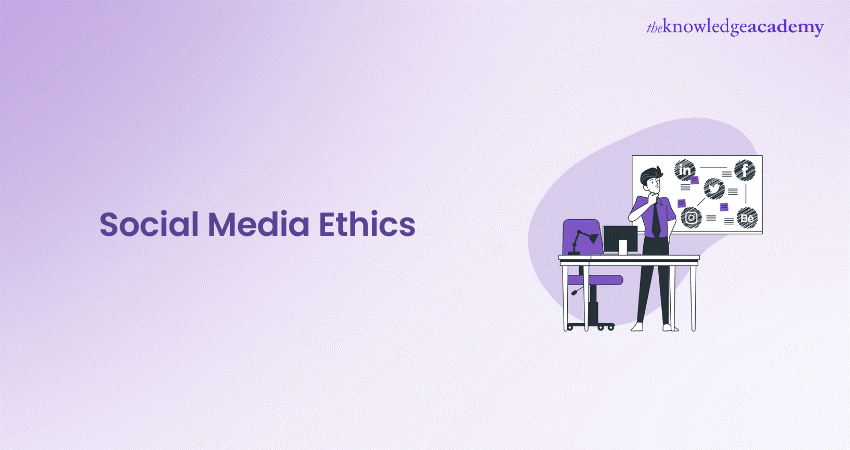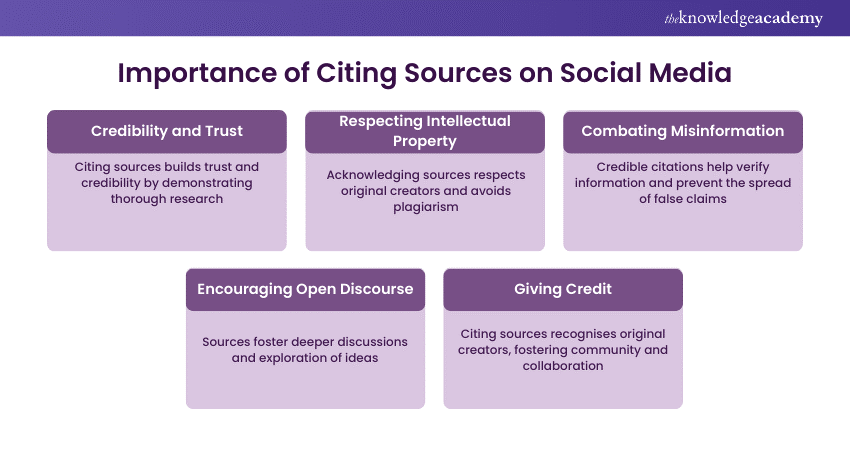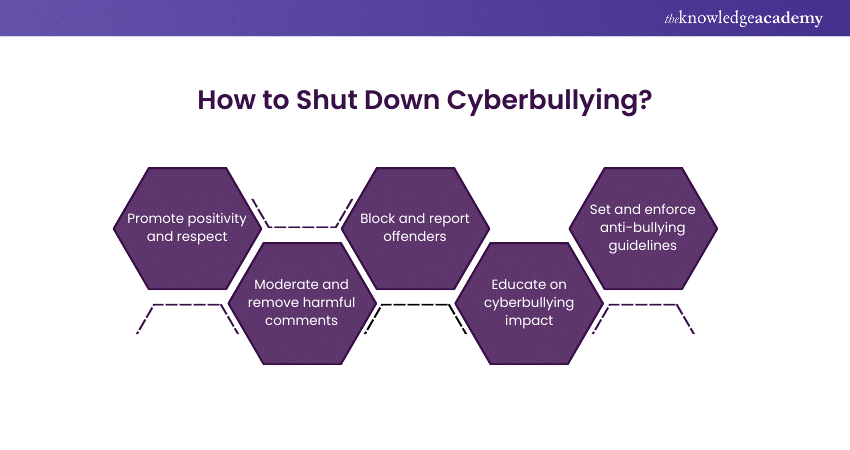We may not have the course you’re looking for. If you enquire or give us a call on + 1-866 272 8822 and speak to our training experts, we may still be able to help with your training requirements.
Training Outcomes Within Your Budget!
We ensure quality, budget-alignment, and timely delivery by our expert instructors.

Stuck in a Social Media quandary? Worried about crossing the line between engagement and ethical blunders? Social Media Ethics can feel like a murky swamp for content creators. You crave connection and audience growth, but also want to be responsible and maintain a positive online presence.
Fear not, fellow content warriors! Social Media Ethics don't have to be a mystery. This blog will be your compass, navigating the ever-evolving landscape of online behaviour. We'll unpack the core principles of responsible Social Media use, from fostering respectful interactions to avoiding misinformation. By the end, you'll be equipped to create engaging content while upholding the highest ethical standards, ensuring your Social Media journey thrives!
Table of Contents
1) What Are Social Media Ethics?
2) Top Social Media Ethics
a) Be Honest
b) Be Transparent
c) Don't Exploit Emotions
d) Don't Compromise Data
e) Cite Your Sources
f) Use Ethical AI Tools
g) Don't Spread Misinformation
h) Be Inclusive in Language and Imagery
i) Don't Fearmonger
j) Don't Spam
3) Conclusion
What Are Social Media Ethics?
Social Media Ethics encompass a set of moral principles that guide behaviour on digital platforms. They ensure interactions are conducted responsibly and respectfully, safeguarding users’ rights and privacy. Ethical Social Media use involves avoiding misinformation, respecting confidentiality, and maintaining transparency. It’s about engaging in civil discourse, not indulging in personal attacks or defamation.
Organisations and individuals must ponder about the impact of their online actions, balancing freedom of expression with the potential consequences on others’ reputations and well-being. As Social Media blurs personal and professional boundaries, it’s crucial to navigate these spaces thoughtfully, upholding standards that foster trust and constructive communication.
Top Social Media Ethics
1) Be Honest
In Social Media marketing, integrity is key. Be truthful about your offerings, ensuring your brand's persona and customer communication reflect this honesty. Misrepresentation breeds scepticism and erodes trust. Avoid overstating capabilities or twisting facts. Focus on the genuine benefits and practicality of your offerings to foster credibility and confidence in your brand.
2) Be Transparent
Transparency is essential in Social Media marketing. While marketing strategies need not be blatantly obvious, concealing intentions with clever content is ill-advised. In today's digital landscape, a company's environmental, business, and political ties are readily accessible. Consumers swiftly evaluate businesses on their ethical stances and moral conduct. Therefore, it's advisable to be open about your affiliations, fostering an atmosphere of trust and openness with your audience.
3) Don't Exploit Emotions
Marketing often involves engaging emotions to inspire action, and while this is a recognised tactic, it's vital to distinguish between resonating with emotions and manipulating them for benefit. Leveraging sensitive topics or periods of turmoil for product promotion is inappropriate. Recall the 2017 Pepsi ad featuring Kendall Jenner, which faced backlash for seemingly exploiting emotional triggers. Such overt exploitation of emotions can lead to negative publicity. It's important to navigate emotional appeals with care and not exploit them.
4) Don't Compromise Data
Data security and privacy are sensitive issues. While businesses have long purchased user data to refine marketing strategies and target audiences effectively, the sale of personal data without consent is a contentious issue from a consumer's viewpoint.
Navigating the ethical complexities of using purchased user data for Social Media campaigns requires caution. A more ethical approach is to grow your audience organically, engaging with individuals who have willingly shared their information, interested in learning about your offerings. Moreover, it's a fundamental ethical principle to never disclose or misuse personal data on Social Media platforms. Upholding data privacy is not just good ethics; it's good business practice.
5) Cite Your Sources

Ethical online behaviour demands proper attribution for shared content. When reposting, always credit the original creator, be it a meme or a photo. With images, ensure you have the right to share—whether it's a purchased stock photo, a CC0 image not requiring attribution, an image with necessary creator credit, or one you've personally created. Respecting copyrights and crediting sources is vital for ethical Social Media engagement.
6) Use Ethical AI Tools
For Social Media marketing, opt for AI tools from trusted sources that prioritise ethical standards. Maintain transparency with your audience about the usage of AI in your strategies. Thoroughly examine the data privacy measures of the AI tools to ensure they conform to your ethical principles and legal obligations. Remember, AI isn't infallible—always verify the accuracy of the information before disseminating it.
7) Don't Spread Misinformation
The prevalence of #FakeNews, especially during events like the COVID-19 pandemic, underscores the importance of verifying information. Ensure that any claim or fact shared on your business profile is sourced from credible, ethical origins. Spreading misinformation can lead to a loss of followers, customers, and in severe instances, legal repercussions. Always prioritise accuracy and reliability in your communications.
8) Be Inclusive in Language and Imagery
Inclusivity and diversity are not just ethical imperatives in Social Media; they are foundational to a business’s integrity and public image. Consumers today expect more than token gestures; they seek genuine representation in language, imagery, and actions. This means actively seeking out diverse perspectives for content creation, ensuring accessibility for all, and fostering an environment where every voice is valued. By showcasing a range of cultures, identities, and experiences, businesses can demonstrate their commitment to a broader societal dialogue, promoting a culture of acceptance and understanding. It’s about creating a space where everyone feels seen, heard, and respected, which in turn, can enhance brand loyalty and trust.
9) Don't Fearmonger
Utilising fear as a motivator in Social Media is ethically questionable. Crafting posts that deliberately provoke undue fear is considered unethical. Negative emotions, when linked to marketing, can inadvertently become associated with the product itself. Ethical marketing practices suggest promoting your business and products by evoking positive emotions, creating an uplifting association rather than one rooted in fear. Therefore, it's advisable to steer clear of fear-based marketing tactics and instead, foster positive connections with your audience.
10) Don't Spam
Clients often inquire about the ideal frequency of Social Media posts to avoid appearing spammy. Here are refined guidelines for maintaining a balanced presence:
a) Adhere to established posting frequency norms for each platform
b) Always seek consent before sending private messages
c) Avoid generic, replicated responses; tailor your replies to ensure authenticity
d) Focus on delivering valuable content and engage in genuine dialogue rather than repetitive self-promotion
These practices help cultivate a positive, spam-free environment on your business’s Social Media channels.
11) Discourage and Shut Down Cyberbullying
Social Media Ethics call for a firm stance against cyberbullying. It's about fostering a community where respect prevails, and harassment is not tolerated. Ethical conduct includes intervening when bullying occurs, providing support to victims, and promoting positive interactions. Platforms and users alike must work to create a safe digital environment, actively discouraging and shutting down any form of online intimidation or abuse. Upholding these principles is key to ensuring a respectful and secure online community for all.

13) Respect People's Privacy
The ethics of Social Media necessitate reverence for both privacy and personal identity. This principle encompasses the safeguarding of personal information and the respect for digital boundaries set by individuals. Ethical engagement on Social Media entails refraining from disseminating identifiable information without explicit consent, steering clear of doxing practices, and acknowledging the right to remain anonymous. It is fundamentally about cultivating a secure environment where personal data remains protected, and identities are not misused. Adhering to these ethical standards is imperative for maintaining trust and integrity in Social Media circles.
12) Don’t Overpromise or Under-Deliver
In ethical marketing, particularly on Social Media, honouring commitments is paramount. When you make a promise to your audience, it’s crucial to deliver on that pledge. If circumstances prevent fulfilment, transparency becomes key. Convey openly and honestly about the reasons for any shortcomings. This practice not only builds trust but also establishes your brand as reliable and accountable. It’s about ensuring that your actions align with your words, thereby fostering a trustworthy relationship with your customers.
Conclusion
Now you've charted the course on Social Media Ethics! Armed with this knowledge, you can definitely navigate the online world, fostering meaningful connections and building a brand you can be proud of. So, go forth and create ethically sound content that resonates with your beloved audience!
Frequently Asked Questions

Fake news and misinformation erode trust, spread falsehoods, and manipulate public opinion, challenging ethical standards by undermining the integrity of information, fostering division, and causing harm to individuals and society.

Algorithms influence content visibility, potentially promoting bias and misinformation, while data privacy concerns revolve around the ethical handling of personal information, requiring transparency, user consent, and protection against misuse.

Individuals and organisations can promote positive ethical norms by sharing accurate information, fostering respectful dialogue, supporting transparency, and advocating for responsible platform policies to enhance trust and accountability.

The Knowledge Academy takes global learning to new heights, offering over 30,000 online courses across 490+ locations in 220 countries. This expansive reach ensures accessibility and convenience for learners worldwide.
Alongside our diverse Online Course Catalogue, encompassing 17 major categories, we go the extra mile by providing a plethora of free educational Online Resources like News updates, Blogs, videos, webinars, and interview questions. Tailoring learning experiences further, professionals can maximise value with customisable Course Bundles of TKA.

The Knowledge Academy’s Knowledge Pass, a prepaid voucher, adds another layer of flexibility, allowing course bookings over a 12-month period. Join us on a journey where education knows no bounds.

The Knowledge Academy offers various Personal Development Courses, including the Earned Value™ Management Foundation and Practitioner Course, and the Earned Value™ Management Foundation Course. These courses cater to different skill levels, providing comprehensive insights into Media Ethics and Governance.
Our Business Skills Blogs cover a range of topics related to Earned Value Management, offering valuable resources, best practices, and industry insights. Whether you are a beginner or looking to advance your Personal Development skills, The Knowledge Academy's diverse courses and informative blogs have got you covered.
Upcoming Business Skills Resources Batches & Dates
Date
 Media Ethics and Governance Training
Media Ethics and Governance Training
Fri 15th Nov 2024
Fri 17th Jan 2025
Fri 21st Feb 2025
Fri 4th Apr 2025
Fri 6th Jun 2025
Fri 25th Jul 2025
Fri 7th Nov 2025
Fri 26th Dec 2025







 Top Rated Course
Top Rated Course



 If you wish to make any changes to your course, please
If you wish to make any changes to your course, please


